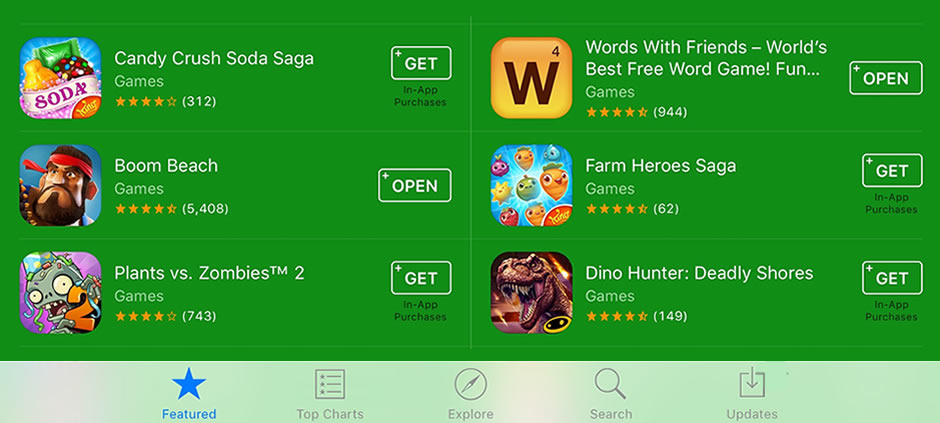
05 May How to Best Monetize Mobile Games
The ability to monetize mobile games has been somewhat of a mystery for gaming companies to figure out. Much progress has been made with the selling of digital rewards in addition to advertising, but mobile gaming companies still have work to do.
The mobile gaming business is rapidly changing as companies seek to capture market share. It has increasingly become saturated with like-kind games. Game makers like Electronic Arts and Microsoft are no longer the only quality game makers in town. Small cap companies like Zynga and Glu Mobile are known for creating blockbuster games. Similar companies such Supercell and King have already been acquired by SoftBank & Activision Blizzard.
According to Newzoo, the overall mobile gaming market is growing at a rapid pace as it is expected to reach $36.9 billion by the end of 2016 and $52.5 billion in 2019. In addition, 70-80% of mobile app downloads are for games according to gamedesigning.org. By now, the seasoned mobile gaming companies have learned which type of mobile games tend to do better than others when it comes to monetization. But, enormous pressure still exists to continuously develop blockbuster games with endless increases in users while generating a bottomline that will impress investors. This has been a serious challenge for mobile game developers.
The Mobile Game Business Problem
Most mobile gaming companies approach monetizing their game the same way. The approach to monetizing a mobile game is typically accomplished by offering advertising opportunities, and/or selling digital rewards to players so they can improve their status in the game.
Since competition is stiff in the mobile gaming space, plastering advertisements across the users screen or forcing users to watch videos is a great way to decrease user attention and retention. So, straight-forward advertising has become somewhat taboo to a maturing mobile gaming market and environment.
For power users that care enough about their status to spend money to improve their status within a game, the digital rewards revenue model works well. But, a digital rewards revenue model has yet to warrant the significant amount of R&D and development cost that it takes to make a blockbuster mobile game. Even with blockbuster games, the return on investment (ROI) has been lackluster. Why?
- Only a small percentage of users are willing to spend money for digital rewards. Having millions of users with the ability to only monetize a small percentage of them is not the best business model.
- Games eventually fall out of popularity as users begin to loose interest for newer games or because of other competing life commitments.
- Players and hackers are using or creating 3rd party software to improve their status among all the other legitimate players. This makes it more difficult for a gaming company to sell digital rewards. For example, SoftBank’s (Supercell) Clash of Clans has recently announced a crackdown on those that are using such methods to improve their game status.
The Mobile Game Business Solution
I will never forget growing-up and visiting the boardwalks on the Jersey shore. I just loved going into the arcades and playing all the games such as skeeball, NBA Jam, or NFL Blitz. But, what I loved even more was the opportunity to win the huge stuffed animal hanging on the wall, or the big red bike hanging from the ceiling. If I collected enough points, I would eventually turn in my points for the red bike that kept calling my name. Every time I came back to the arcade, my #1 goal was to rack-up more points to eventually take the bike home. In retrospect, my parents spent 10x what the bike would have cost at the local bike store. But, the thrill of playing all the games to actually win something in the end was well worth it. At least I thought so. Even the adults received the same enjoyment as they too were playing arcade games to take something home with them such as a new toaster or blender.
My love for games has transitioned from the local arcade to my iPhone. However, I am not willing to spend money just to have my name on a virtual leaderboard. I believe most mobile game users feel the same way, and would more freely spend money on mobile games if real rewards were offered, not just digital rewards. Otherwise, spending money only to be leapfrogged by another player who spends more money than you does not create an attractive gaming environment.
Best Way to Monetize Mobile Games
A player earns points which gives them a higher status in the game. At a certain number of points and/or levels of the game, the player should have the opportunity to choose a real prize. The prizes should be geared towards the audience the game is designed for. The gaming companies can continue to offer digital rewards for a fee. But, by incorporating real prizes into games, the purchase of digital rewards becomes more attractive for a much larger percentage of mobile game users. Similar to product placement in a movie, a game can display digital illustrations of a manufacture’s product within the game which are available to win. Product showcasing verses straight-forward advertising becomes non-obtrusive which creates a positive vs. negative user experience. I think of the old game show “Let’s Make A Deal.” Products are being advertised, but for the participant to win. Instead of seeking traditional advertising dollars, product manufactures can receive better advertising of their product in exchange for managing the fulfillment of the game’s prizes for the gaming company. This approach to monetizing mobile games would provide two major benefits that would create a better scenario for all parties involved – advertisers, gaming companies, and the users.
- Provides a better cost-benefit analysis (CBA) for advertisers.
- Generates greater revenue opportunities for digital rewards as it appeals to a much larger audience of mobile game users.
This monetization strategy would certainly entice more people to spend more freely on mobile games. Gaming companies should be developing a monetization strategy which reaches the majority of game users, not just the minority power users.
Resources:
The Global Games Market Reaches $99.6 Billion in 2016, Mobile Generating 37%





No Comments